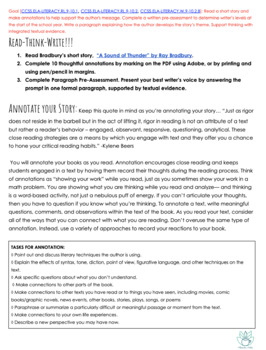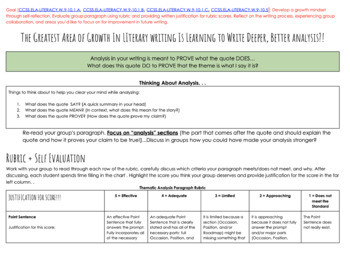Back-to-School Writer's Boot Camp Unit: Text-dependent Literary Analysis
- Google Docs™

Products in this Bundle (11)
showing 1-5 of 11 products
Description
Hi. Thanks for purchasing my unit. Please rate and review my lessons, and follow me to check out the other ELA lessons and units I create. I’m hopeful your students will find meaning in how these lessons work together to achieve an overarching purpose. These lessons work together as a cohesive whole to guide students to enduring understandings and mastery of essential learning outcomes!
I make customized lessons and units, upon request. I will make a lesson, a grouping of lessons, or a unit of lessons for any text(s), focusing on any standard(s). I charge a flat fee per lesson. Please contact me to order your customized lessons: fletcherfiles22@gmail.com
Unit Title: Back-to-School Writer's Boot Camp Unit: Text-dependent Literary Analysis
Number of Lessons: 11 standards-based lessons, including creative writing, formal literary analysis writing, group collaborative writing, rubrics, graphic organizers, text-dependent-questions, and lessons on self-evaluation highlighting responding to teacher feedback. Additionally included, are guided notes on paragraph expectations and formatting. Unit texts include short stories and non-fiction.
This is a Back-To-School Writer’s Boot Camp, intended to start the year off strong with the writing process and small group collaboration, as major focuses. This unit can be used at any time of year to refocus students on the writing process and expectations for strong, vibrant, evidence-based writing.
Length of Unit: Completion of unit takes 3-4 weeks, dependent on minutes of instruction per class.
Student Level: Unit is appropriate for grades 9-12, when teaching to grades 10-12 adjust CCSS to reflect upper grades
Unit Sequence & Lesson Titles:
1.1– Writer's Bootcamp Pre-Assessment
1.2– Plot: "A Sound of Thunder" by Ray Bradbury
1.3– Literary Analysis: How to Analyze Theme
1.4– Thesis Statements: "Only Daughter" by Sandra Cisneros
1.5– How to use textual evidence to prove your thesis is true
1.6– Group Literary Analysis Paragraph: Theme of "Only Daughter" by Sandra Cisneros
1.7– Paragraph Rubric and Self Evaluation
1.8– Writing "Where I'm From" Poetry & Group Collaboration
1.9– Thematic Analysis + Supporting Quotes: "The Powder Blue Dragon" by Kurt Vonnegut
1.10– "The Powder Blue Dragon" Paragraph: Writer's Boot Camp Assessment
1.11– Paragraph Revisions: “The Powder Blue Dragon”
Unit Objectives:
1.1– Read a short story and make annotations to help support the author's message. Complete a written pre-assessment to determine writer’s levels at the start of the school year. Write a paragraph explaining how the author develops the story’s theme. Support thinking with integrated textual evidence.
1.2– Identify parts of a story’s plot, then complete a plot diagram. Craft conclusions about the causes and effects of each part of the plot by answering text-dependent-questions, focusing on using what the text explicitly says to make meaningful answers.
1.3– Determine a theme of a text and analyze in detail its development. Integrate textual evidence to support analysis of what the text says explicitly as well as inferences drawn from the text. Participate in collaborative group discussion: clarify, verify, or challenge thematic ideas and conclusions.
1.4– Learn how to write excellently worded, informative, argumentative thesis statements which are directly supported by textual evidence. Evaluate example thesis statement. Practice finding the theme of a short story, then writing a thesis describing the theme.
1.5– Work on the writing process. Develop a thesis by identifying and supplying evidence as support. Link the thesis to quotes and create cohesion by developing your argument with correctly integrated quotes from the text.
1.6– Analyze a short story’s theme. Cite the central ideas of the text and find the best textual evidence to prove the idea is true. Write a well-formatted literary analysis paragraph focusing on a direct specific thesis, supported with correctly integrated quotes.
*Lesson includes: guided notes on paragraph expectations and formatting.
1.7– Develop a growth mindset through self-reflection. Evaluate group paragraph using rubric and providing written justification for rubric scores. Reflect on the writing process, experiencing group collaboration, and areas you’d like to focus on for improvement in future writing.
1.8– Identify figurative language in poetry and be able to explain the purpose of figurative language devices. Students will craft their own Where I’m From poems using figurative language. Then, collaborate with a group to merge parts of Where I’m From poetry to form a cohesive poem full of figurative language devices painting a vivid picture of imagery conveying where your group collectively comes from.
1.9– Read a short story, chart its plot, find its deeper meaning through thematic analysis. Decipher the universal truth the author is teaching readers, support this theme with textual evidence.
1.10– Analyze the author’s theme in a short story. Cite the central ideas of the text and find the best textual evidence to prove the idea is true. Write a well-formatted literary analysis paragraph focusing on a direct specific thesis, supported with correctly integrated quotes.
*There is a rubric for the paragraph, as well as guided notes on paragraph expectations and formatting.
1.11– Develop and strengthen your writing by revising and editing according to rubric feedback, examples, and targeted learning resources. Produce clear and coherent paragraphs in which the development, organization, and style is proficient. Focus on selecting the best text evidence to prove a claim is true, while honing in on refining the writer's voice.
*Lesson includes: targeted learning resources to address weak thesis, integration of quotes, analysis, transition use, eliminating wordiness, active vs. passive writer’s voice, and author’s word choice.
Key Concepts:
Analysis, Analysis Paragraph, Annotations, Author’s Choices, Author’s Purpose, Back to School, Cause/Effect, Central Idea, Claim-Evidence-Warrant, Close Reading, Collaboration, Collaborative Feedback, Critical Thinking, Deepening your literary analysis, Detailed rubric, Editing, Example Paragraph, Evidence, Examples, First weeks of school, Giving Context to Quotes, Graphic Organizer, Group Collaboration, Group Paragraph, Group Work, Growth Mindset, Guided Notes, How to Annotate, Independent Work, Inference, Individual Work, Individualized Feedback, Integrating Quotes, Introduction Assignment, Justification for Scores, Literary Analysis Paragraph, MLA Format, Organization, Paragraph Pre-Assessment, Parts of a good thesis, Parts of Plot, Paragraph Expectations, Plot, Plot Diagram,Point Sentence, Prompt break-down, Quote Lead-In Examples, Quote Lead-In Techniques, Quote Integration, Qualifiers, Reflection, Reflective Questions, Refining Word Choice, Revisions, Rubric, Self-evaluation, Self-assessment, Sequencing of Events, Short Story, Skills-Based Lesson, Supporting Evidence, Targeted Learning Resources, Teacher Example, Teacher Feedback. Teaching Writing as an Argument, Text-Dependent-Questions, Text-Dependent-Writing, Textual Evidence, Text Structure, Theme, Thematic Analysis, Thesis break-down, Thesis Statement, Theme, Theme Statements, Thematic Analysis, Transition Words, Visual Learning, Word Choice, Writer’s Voice, Writing Assessment, Writing as an Argument, Writing Assignment, Writing Lesson, Writing Process
Texts:
“A Sound of Thunder” by Ray Bradbury
Annotating Literature: Techniques & Examples by Study.com
How to Annotate a Book by Wikihow
"Only Daughter” by Sandra Cisneros
'Where I'm From': A Crowdsourced Poem That Collects Your Memories Of Home by NPR
"The Powder Blue Dragon" by Kurt Vonnegut
Open Oregon Educational Resource: Developing a Strong, Clear Thesis Statement
Purdue Owl Handout: Quoting Others
University of Michigan Handout: How Can I Create Stronger Analysis?
Purdue Owl Handout: Active Versus Passive Voice
Writers.com: word choice in writing –The Importance of Word Choice in Writing
Standards:
Reading:
Writing:
Speaking & Listening:
*If you like this lesson, click here to preview the whole unit this lesson came from, lesson groupings from this unit, other singular lessons from this unit, or any other lessons from Fletcher Files
I make customized lessons and units, upon request. I will make a lesson, a grouping of lessons, or a unit of lessons for any text(s), focusing on any standard(s). I charge a flat fee per lesson. Please contact me to order your customized lessons: fletcherfiles22@gmail.com





